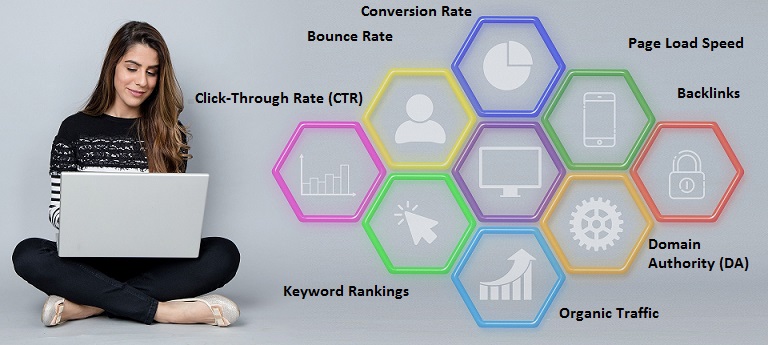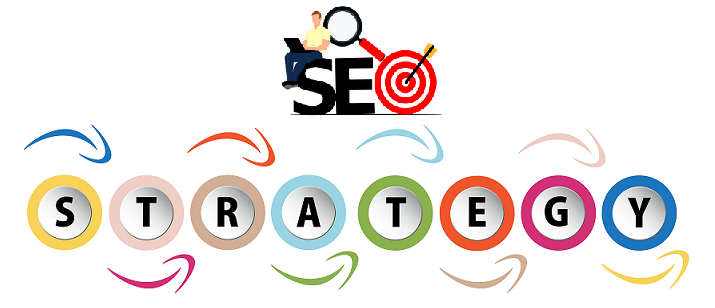I. Introduction
It’s crucial to monitor specific metrics that can let you know how well your website is functioning if you want to raise its search engine rating. These metrics are commonly known as Search Engine Optimization (SEO) metrics.

A. Explanation of SEO Metrics
SEO metrics will give you valuable insights into how users are interacting with your website. It also tells you what is working well for your website and what could you do to improve some of the issues that you are facing. Once you start tracking these metrics then you can make data-driven decisions to optimize your website. It helps in improving your website’s ranking on search engine results pages (SERPs).
B. Importance of Tracking SEO Metrics
Why is it crucial to monitor these data, then? One benefit of tracking SEO metrics is that it enables you to judge the effectiveness of your website in comparison to that of your competitors. It also enables you to pinpoint areas where the performance, content, and user experience of your website may all be enhanced.
You can pass up crucial chances to raise your website’s rating and increase traffic if you don’t monitor these indicators. So, tracking SEO data is essential if you’re serious about increasing the exposure of your website on search engines.
II. Key SEO Metrics to Track
There are several key SEO factors you need to be aware of. You should keep an eye on these factors while you are tracking the SEO metrics of your website. As said before these metrics will give you valuable insights into your website’s performance. It will also help you to identify areas where you need to improve.

A. Organic Traffic
First up, we have organic traffic. This metric measures the number of visitors that visited your website and who found you through a search engine like Google or Bing. The higher your organic traffic, the more visible your site is on search engines.
B. Keyword Rankings
Next, we have keyword rankings. This metric measures how well your website ranks for specific keywords or phrases that people search for. People are more likely to discover your website when they search for those keywords that have higher rankings.
C. Click-Through Rate (CTR)
The click-through rate is yet another crucial indicator. (CTR). This gauges the percentage of users who open the link to your website when it pops up in search engine results. The higher your CTR, the more effective your website’s meta description and title tags are in convincing people to click through to your site.
D. Bounce Rate
Bounce rate is another important metric to keep an eye on. This calculates the percentage of visitors who go away from your site after viewing only one page. A high bounce rate may be a sign that visitors aren’t finding what they’re searching for. It could also mean that your site isn’t engaging enough.
E. Page Load Speed
Page load speed is another important factor to consider. People are more likely to abandon your site before it even finishes loading if it takes longer to load. A slow loading time can also negatively impact your website’s ranking on search engines.
F. Backlinks
Backlinks are another key metric to track. These are the links from other websites that point to your website. The more high-quality backlinks you have, the more trustworthy your site appears to search engines.
G. Domain Authority (DA)
Another metric you can use to measure your website’s trustworthiness with search engines is domain authority (DA). DA measures how well your website is likely to rank on search engines based on several factors, including backlinks and content quality.
H. Conversion Rate
The last metric is the conversion rate. It might happen that a certain percentage of visitors will take a specific action on your website like making a purchase or filling out a form. This category of visitors and its percentage is measured by the conversion rate metric. If you have a higher conversion rate then your website is more effective in achieving your business goals.
So there you have it – the key SEO metrics you should be tracking to ensure your website is performing at its best!
III. Tools for Tracking SEO Metrics
You need tools to track and measure SEO metrics. There are several tools available that can help you gather and analyze data about your website’s performance. Let us go through a few most popular tools.

A. Google Analytics
First up, we have Google Analytics. This is a free tool that Google provides to track a wide range of website metrics like traffic, the location of the visitors coming from, the length of time of stay on your site, and your frequently visited pages. It is a great and powerful tool for tracking your website’s performance over time.
B. Google Search Console
Google Search Console is another free tool from Google that’s focused specifically on your website’s presence in search results. It allows you to monitor your website’s visibility on Google searches. It also shows you the keywords you’re ranking for and shows the pages that are showing up in search results.
C. SEMrush
SEMrush is a paid tool that offers a wide range of features for tracking and analyzing your website’s SEO performance. It allows you to track keyword rankings, analyze backlinks, and even perform an audit of your website’s SEO health.
D. Ahrefs
Ahrefs is another popular tool for tracking backlinks and analyzing your website’s SEO performance. It offers features like keyword tracking, site audit reports, and competitive analysis to help you stay ahead of the game.
E. Moz Pro
Finally, we have Moz Pro, which offers a wide range of features for tracking your website’s SEO performance. It includes tools for tracking keyword rankings, analyzing backlinks, and even monitoring social media activity related to your brand.
There are several options for tracking the SEO success of your website, regardless of whether you want a simple free tool or a more comprehensive premium solution. A wise decision would be to choose the tool which fits best according to your needs and goals. You must also feel easy to use the toll consistently to stay on top of your website’s performance over time.
IV. How to Use SEO Metrics to Improve Your Strategy

The actual value of tracking SEO metrics is found in utilizing the information to gradually increase your website’s performance. Here are some pointers for using SEO stats to hone your plan and stay on top of the competition.
A. Identify areas for improvement
First, use your metrics to identify areas for improvement. Do any of your website’s pages not operate as effectively as they ought to? Do you have any targeted keywords that aren’t bringing in as much traffic as you’d like? You can begin to concentrate your efforts on enhancing these areas of weakness by recognizing them.
B. Adjust and optimize your content
When you’ve determined which areas need work, it’s time to optimize your content. This could mean updating your website’s meta descriptions and title tags to make them more enticing, or tweaking your content to better target the keywords you’re trying to rank for. You can start noticing improvements in the functionality of your website by making these changes.
C. Monitor progress and make data-driven decisions
It’s crucial to keep track of your development over time and to make data-driven judgments about how to modify your approach. You can see what’s working and what’s not by consistently monitoring your SEO analytics and changing your strategy as necessary.
D. Keep up with algorithm changes
Finally, keep up with algorithm changes. Search engines like Google are constantly updating their algorithms, which can impact your website’s ranking and visibility. By staying up-to-date on these changes and adjusting your strategy accordingly, you can stay ahead of the competition and ensure that your website is performing at its best.
So there you have it – some tips for using SEO metrics to improve your strategy. By tracking your website’s performance, making data-driven decisions, and keeping up with the latest algorithm changes, you can stay ahead of the game and ensure that your website is visible and successful in search results.
V. Conclusion
In conclusion, tracking SEO metrics is crucial for ensuring that your website is visible and successful in search results. Here are some key takeaways to keep in mind:
A. Recap of key takeaways
Organic traffic, keyword rankings, click-through rate, bounce rate, page load speed, backlinks, domain authority, and conversion rate are all important SEO metrics to track.
There are various tools available for tracking SEO metrics like Google Analytics, Google Search Console, SEMrush, Ahrefs, and Moz Pro.
Use SEO metrics to enhance your approach, pinpoint problem areas, modify and improve your content, track your progress, and keep abreast of algorithm changes.
B. Final thoughts on the importance of tracking SEO metrics.
In the end, my final thoughts are that tracking SEO metrics is crucial since it enables you to assess the effectiveness of your website, spot potential areas for development, and make data-driven decisions about how to modify your approach. You can make sure that your website is visible and successful in search results by monitoring its performance and making adjustments as necessary.
Hence, if you haven’t already, start monitoring the SEO stats for your website right away. Your website (and your audience!) will appreciate it.
Read More:
ECommerce SEO Audit: A Comprehensive Guide – Seabuck Digital
Google My Business Optimization Checklist: A Definitive Guide in 2023 – Seabuck Digital
A Definitive Guide to Google’s Ranking and Search Appearance – Seabuck Digital
Keyword Research in SEO: The Comprehensive Guide in 2023 – SeabuckDigital

